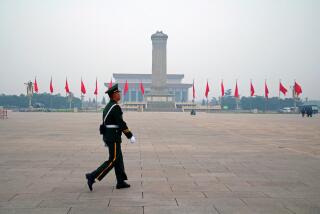Without warrant, Hong Kong unlikely to act against Snowden
BEIJING -- Hong Kong authorities are not likely to take action against their most famous fugitive, Edward Snowden, unless the United States issues a warrant for his arrest, a former legislator said.
“The Hong Kong government will do nothing until the U.S. government takes steps to have him brought back,” Martin Lee, a democracy activist and one of the best-known lawyers in Hong Kong, said Tuesday.
Lee said at the moment there is nothing preventing the 29-year-old former defense contractor from leaving. Snowden has been identified as the source of leaks about the U.S. electronic surveillance program.
PHOTOS: Famous document-leakers in recent history
“He is not under arrest. He can just leave Hong Kong and fly away. There is nobody to stop him. He may fear that the CIA is after him and that somebody would kidnap him, but that of course would be illegal and I think not very likely.”
Snowden checked out of his hotel Monday, shortly after a recorded interview was aired on the website of the British newspaper the Guardian. Despite the efforts of hoards of journalists scouring Hong Kong hotels, his current whereabouts remain unknown.
Hong Kong authorities have remained curiously mute about his case. The Chinese government, which has administered Hong Kong as a self-rule territory since the handover from Britain in 1997, also has declined comment on Snowden’s case.
SNOWDEN’S DILEMMA: What are the possibilities for asylum?
Among Chinese intellectuals, however, Snowden has admirers who are agitating for Beijing to offer him political asylum – a suggestion rooted in anger over the many dissidents who have fled to the United States.
“He is under persecution from the U.S. government because he told the truth. I hope the Chinese government can provide him political asylum to protect human rights and freedom of speech,” wrote Guo Songmin, an editor for a state-owned magazine.
“At least his IQ and skills are much higher than those Chinese who have been granted asylum in the US!” wrote another microblogger, economist Mei Xinyu.
Ultimately, Beijing could have a say in what happens to Snowden. Under the extradition treaty between the United States and Hong Kong, which took effect in 1998, the Chinese central government can intervene in cases involving foreign affairs and national security. But so far there is no indication that the new Chinese leadership wants anything to do with Snowden.
Except for a handful of U.S. soldiers during and after the Korean War, there is no tradition of Americans defecting to mainland China.
“People used to defect to the Soviet Union, but not to the Peoples Republic of China,” said Zhan Jiang, head of the media department at the China Youth University for Political Sciences in Beijing. “The only people who ever want to defect to China are North Koreans.”
Julian Assange, founder of Wikileaks, who is now hiding in the Ecuadorian Embassy in London, has advised that Snowden head for Latin America.
“Latin America has shown in the past 10 years that it is really pushing forward in human rights. There’s a long tradition of asylum,” Assange said in an interview with CNN.
ALSO:
Snowden’s dilemma: What are the possibilities for asylum?
Britain denies using PRISM to get around domestic spying laws
Edward Snowden gone from Hong Kong hotel, whereabouts unknown
More to Read
Start your day right
Sign up for Essential California for news, features and recommendations from the L.A. Times and beyond in your inbox six days a week.
You may occasionally receive promotional content from the Los Angeles Times.






